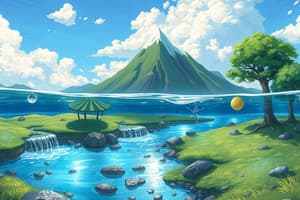Podcast
Questions and Answers
Which of the following processes directly contributes to the addition of water to the oceans?
Which of the following processes directly contributes to the addition of water to the oceans?
- Condensation forming clouds over land
- Evaporation from lakes
- Runoff from land surfaces and precipitation directly into the ocean (correct)
- Precipitation over land
Without wind, the majority of Earth's surface would likely be covered in deserts.
Without wind, the majority of Earth's surface would likely be covered in deserts.
True (A)
What two processes are essential for the formation of sedimentary rocks underground?
What two processes are essential for the formation of sedimentary rocks underground?
Compaction and cementation
For precipitation to occur, ______ must first take place, leading to the formation of clouds.
For precipitation to occur, ______ must first take place, leading to the formation of clouds.
Match each process with its role in the water cycle:
Match each process with its role in the water cycle:
Flashcards
Evaporation
Evaporation
Water turns into vapor due to heat.
Condensation
Condensation
Water vapor turns into liquid, forming clouds.
Precipitation
Precipitation
Water falling back to Earth as rain, snow, etc.
Runoff
Runoff
Signup and view all the flashcards
Energy source for the water cycle
Energy source for the water cycle
Signup and view all the flashcards
Study Notes
- Evaporation needs energy from the sun.
- The water cycle adds water to the ocean through runoff and direct precipitation.
- Coal forms from plants on land, and oil forms from ocean organisms.
- Wind moves moist air from above the ocean to above land, preventing Earth's surface from becoming mostly deserts.
- You should know the definitions of the 4 main parts of the water cycle.
- Fossil fuel type depends on the type of remains, like land plants or ocean animals.
- Condensation is important in the water cycle because it forms clouds, which are needed for precipitation to occur.
- The order of the water cycle is evaporation, condensation, precipitation, runoff, and collection/accumulation.
- Coal must form underground because only Earth's interior has enough heat and pressure to form it.
- When sedimentary rocks form, compaction and cementation occur underground.
- Ensure you understand the steps of the rock cycle.
- The Sun provides energy for the water cycle.
- Rivers help form sedimentary rock by weathering rock into sediment, which then deposits in the ocean.
Studying That Suits You
Use AI to generate personalized quizzes and flashcards to suit your learning preferences.




